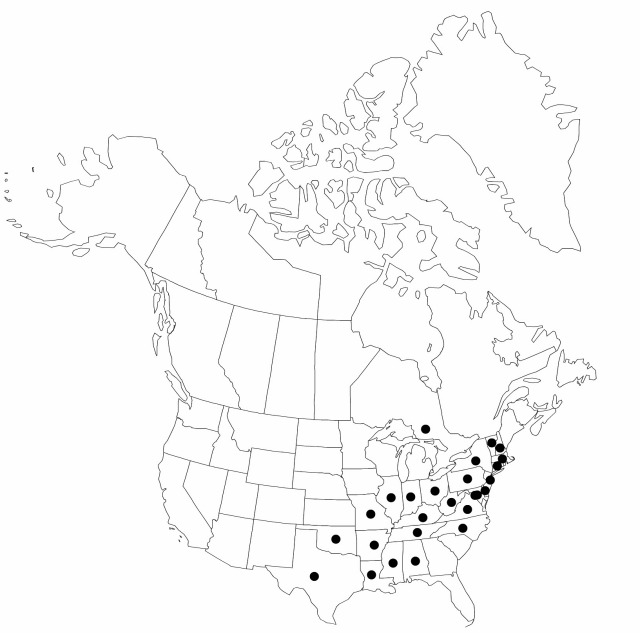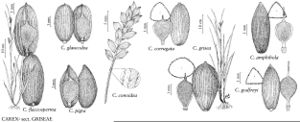Carex glaucodea
Proc. Amer. Acad. Arts 7: 395. 1868.
Plants densely cespitose; rhizome internodes 1.2–2.8 mm thick. Culms yellow-brown at base, 10–50 cm. Leaves: sheaths glabrous; blades glaucous, widest blades (5.1–)5.7–10.8 mm wide, smooth abaxially or sparsely antrorsely scaberulous on main veins. Inflorescences 0.56–1 of culm height; peduncles of lateral smooth; peduncles of terminal spikes (0.5–)1.6–15(–31) mm, barely to much exceeding lateral spikes; proximal bract sheath loose, abaxially glabrous, sheath front apex truncate; ligules 5.2–10 mm; distal bract slightly shorter than to much exceeding terminal spike. Spikes 3–6, distal 2–4 overlapping; lateral spikes pistillate, longest ones with (14–)19–45(–65) perigynia, 9–32(–41) × 4.1–6.5(–7.3) mm, ratio of spike length (in mm) to flower number = (0.56–)0.67–1.1(–1.3); terminal spikes 7–35 × (1.3–)1.5–3(–3.6) mm. Pistillate scales (1.6–)2–3.2(–3.7) × 1.5–2.2(–2.5) mm, margins whitish, entire, apex awnless or with awn to 1(–1.5) mm. Staminate scales 4.3–5.2 × 1–1.8 mm. Anthers 1.8–3.6 mm. Perigynia spirally imbricate, 43–54-veined, unwrinkled, oblong-ovoid, obtusely triangular in cross section, 3.2–4(–4.1) × 1.5–2.5 mm, (1.5–)1.8–2.3(–2.5) times as long as wide, dull, base very gradually tapered, apex gradually tapered; beak absent or straight, 0–0.3 mm. Achenes obovoid, 2.4–3 × 1.3–1.6(–1.7) mm, 0.5–0.63 times as long as perigynia, loosely enveloped by perigynia; stipe straight 0.05–0.3(–0.4) mm; beak bent (0–)30–90°, 0.2–0.4 mm.
Phenology: Fruiting spring–early summer.
Habitat: Mesic to wet-mesic deciduous forests or seasonally moist prairies, usually in clays or loams
Elevation: 10–1900 m
Distribution

Ont., Ala., Ark., Conn., Del., D.C., Ill., Ind., Ky., La., Md., Mass., Miss., Mo., N.H., N.J., N.Y., N.C., Ohio, Okla., Pa., Tenn., Tex., Vt., Va., W.Va.
Discussion
Carex glaucodea is frequent. In the southern portions of its range, it occasionally grows with and hybridizes with C. flaccosperma (see discussion under 298. C. flaccosperma).
Selected References
None.
